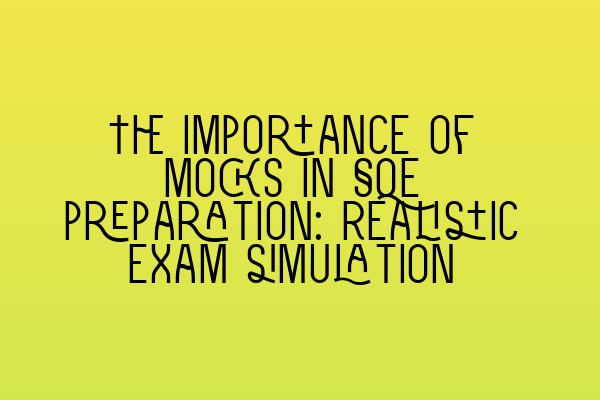The Importance of Mocks in SQE Preparation: Realistic Exam Simulation
Preparing for the Solicitors Qualifying Examination (SQE) is undoubtedly a challenging and demanding task. Aspiring solicitors need to have a solid understanding of legal concepts and principles, as well as the ability to apply them in practical scenarios. While studying textbooks and attending lectures are essential components of the preparation process, there is one often-overlooked tool that can greatly enhance your chances of success: mock exams.
Mock exams are simulated tests that mimic the format, structure, and content of the actual SQE exams. These practice tests are designed to replicate the real exam experience as closely as possible, providing candidates with an invaluable opportunity to assess their progress, identify areas of weakness, and refine their exam technique. Let’s explore some of the reasons why mock exams are crucial for effective SQE preparation.
1. Familiarization with Exam Format and Structure
The SQE consists of both written and practical assessments, each with its unique format and structure. By taking mock exams, candidates can familiarize themselves with the different question types, time constraints, and exam requirements. This familiarity is vital as it allows candidates to develop a strategy for approaching each section of the exam, manage their time effectively, and optimize their performance.
Mock exams provide candidates with a realistic simulation of the SQE, enabling them to experience the pressure and time constraints they will face on the actual exam day. This simulation helps to alleviate anxiety and nervousness, ensuring that candidates are better prepared mentally and emotionally for the challenges ahead.
2. Assessment of Knowledge and Understanding
One of the primary purposes of mock exams is to assess a candidate’s knowledge and understanding of the legal concepts and principles relevant to the SQE. By attempting practice questions, candidates can gauge their level of comprehension and identify any gaps in their knowledge. This process allows candidates to revise and reinforce their understanding of key topics, leading to improved performance in the actual exam.
Mock exams provide candidates with immediate feedback on their answers. This feedback not only informs them of the correct responses but also helps them understand why certain answers are incorrect. By analyzing and learning from their mistakes, candidates can strengthen their understanding and develop a more confident and accurate approach to tackling similar questions in the future.
3. Identification of Weaknesses and Areas for Improvement
Mock exams serve as a diagnostic tool, helping candidates identify their weaknesses and areas for improvement. By reviewing their performance in practice tests, candidates can pinpoint specific topics or question types that they struggle with. This awareness allows candidates to focus their revision efforts on these areas, ensuring that they allocate their limited study time wisely.
Moreover, mock exams provide candidates with an opportunity to refine their exam technique. They can experiment with different approaches, such as time management strategies, note-taking methods, or essay structuring techniques, to determine what works best for them. This experimentation and practice allow candidates to optimize their performance and become more confident and efficient in their exam execution.
4. Building Confidence and Reducing Exam Anxiety
One of the biggest challenges candidates face during the SQE is managing exam anxiety. The pressure of performing well can negatively impact their ability to recall information, think clearly, and communicate effectively. Mock exams help to alleviate this anxiety by providing candidates with a safe environment to practice and build confidence.
By completing multiple mock exams, candidates become familiar with the exam process and gain confidence in their abilities. This familiarity and confidence can significantly reduce exam anxiety and improve overall performance. Mock exams also allow candidates to develop effective coping mechanisms for dealing with stress and time pressure, further enhancing their exam readiness.
5. Enhancing Time Management Skills
Time management is crucial in the SQE, where candidates are often required to answer a large number of questions within a limited timeframe. Mock exams enable candidates to practice managing their time effectively by setting strict time limits for each section of the test. This practice helps them develop a sense of pacing and prioritize their answers to maximize their score.
Additionally, mock exams provide candidates with the opportunity to practice the skill of allocating time based on question difficulty. By attempting a variety of mock questions, candidates can identify patterns in terms of question complexity or length, allowing them to allocate their time accordingly during the actual exam. This skill is essential for optimizing performance and achieving the highest possible score.
Conclusion
Mock exams are an indispensable tool in SQE preparation. They offer candidates a realistic simulation of the exam experience, allowing them to familiarize themselves with the format, assess their knowledge and understanding, identify weaknesses, build confidence, and enhance time management skills.
If you are preparing for the SQE, make sure to incorporate mock exams into your study plan. They will not only help you assess your progress but also refine your exam technique and improve your chances of success. Remember, practice makes perfect!
Related Articles:
- Legal Considerations in Residential Leases: Essential Insights for Solicitors
- Freehold vs Leasehold: Understanding the Differences
- Understanding Planning Permission and Land Use: Key Considerations for Legal Professionals
- Land Charges: Understanding and Managing Encumbrances
- Property Practice in the UK: Essential Skills and Knowledge for Success

Leave a Reply